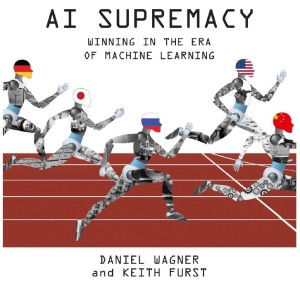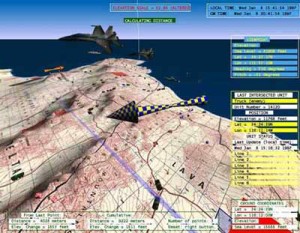“The potential consequences of artificial intelligence are profound,” said Daniel Wagner, founder and CEO, Country Risk Solutions. “We’re just at the beginning of the runway. How resources are utilized will change significantly.” AI will affect all areas of life, and it is possible new forms of digital authoritarianism may arise.
Wagner was one of two speakers at a webinar titled “Artificial Intelligence: Running the Race and Managing the Risks,” sponsored by the Global Association of Risk Professionals (GARP) on October 16, 2018. Wagner and Keith Furst co-authored the new book AI Supremacy: Winning in the Era of Machine Learning.
His presentation summarized the effect of AI on six areas: business, jobs & manufacturing, cyber security, international relations, China’s quest for supremacy, and law.
Business
Wagner said there were great upsides to the business uses for AI. Processes can be streamlined and integrated. This will allow better utilization of resources, and collaboration with many others.
Jobs & Manufacturing
Wagner said there is a persistent worry that AI will be a “job killer.” The same fear existed when automated teller machines were introduced, but ATMs did not kill off bank branches. On the contrary, there are more now than ever before. He predicted AI would lead to rising productivity and efficiency.
Some jobs are likely to be greatly reduced in size. For example, AI will reduce jobs based on the time required to research legal issues. Natural language processing can predict what documents might be relevant to a case.
“AI is a catalyst for change,” said Wagner. “Organizations that are slow to get in the game will have less chance to catch up.
Cyber Security
“Malware is being designed with adaptive, success-based learning to improve the accuracy and efficacy of cyberattacks,” as noted by Wagner and Furst in an August 2018 article for Epoch Times.
“Yuval Harari predicts that by 2050 cell phones will be wired into us,” Wagner said. Predictive power is becoming ever more accurate, and AI itself will become a target. “When AI takes over the stakes will be high.”
International relations
“Data will become a virtual battlefield,” Wagner said. Rivals will use ploys such as infecting databases with spurious data. The norms governing international relations may become weakened. The rule of law governing AI is new and poorly understood, raising the prospect of a radically altered international landscape going forward.
Fake news will be promulgated so quickly that reputation risk will become more difficult to manage.
China’s quest for supremacy
“China aims to achieve AI supremacy by 2030,” Wagner said. “They’ve got the capital, people, and computing power to make that a reality.”
Without the restrictions typically attached to government actions in a democracy, there can be unrestricted warfare and state theft. Not a lot is known about the full extent of China’s ambition in the AI arena , but they are already gathering tremendous and varied forms of assets and training on datasets. “My guess is they will succeed sooner than 2030.”
The Law
Predictive analytics will ease the enormous amount of work involved in reading past legal judgements. “Guilt will be established in some courtrooms by algorithm going forward.”
Wagner said that some jurisdictions are trying to limit the reach of AI. For example, the General Data Protection Regulation (GDPR) is the privacy legislation recently enacted in Europe that some pundits have dubbed “the right to be forgotten.”
The rise of AI means that globalization will become more pervasive. It will continue to blur boundaries and blend value chains.
Fundamental Questions
“There are some fundamental questions to ask,” Wagner said. “Should we fear AI or embrace it?” Eighty percent of organizations participating in a recent poll said they were pursuing AI. The race is on.
“It’s an evolving technology in search of a philosophy,” he said. We may be witnessing the dawn of “diminished human competence,” after so many centuries of struggling for control over the physical world and designing machines.
Q & A
The joint presentation by Daniel Wagner and Keith Furst was followed by a lively Q&A.
“Artificial Super Intelligence, wherein machines are actually smarter than we are, could appear in as little as 10 to 15 years from now,” said Wagner, “not 50 to 100 years, as we used to think.” He pointed to the huge progress made by autonomous cars as evidence of the accelerated rate of technological change.
Will AI create new job avenues? Yes, according to Keith Furst, who predicted “new jobs will arise, such as managing AI strategy.” Also, as models become more complex, organizations will require more people to validate the models.
In the brave new world of AI, “what could go wrong? Where should we allocate concern?” asked one audience member. Wagner predicted “hidden bias” will be one danger. In the example he gave, “the algorithm was not biased, but the data given to it was.” ª
Daniel Wagner’s presentation was interwoven with Keith Furst’s presentation. Click here to read about Keith Furst’s presentation.
The ATM image is from Wikipedia Commons.
The virtual battlefield image is from https://science.howstuffworks.com/virtual-military4.htm .
Check out other resources available at Country Risk Solutions: www.countryrisksolutions.com





